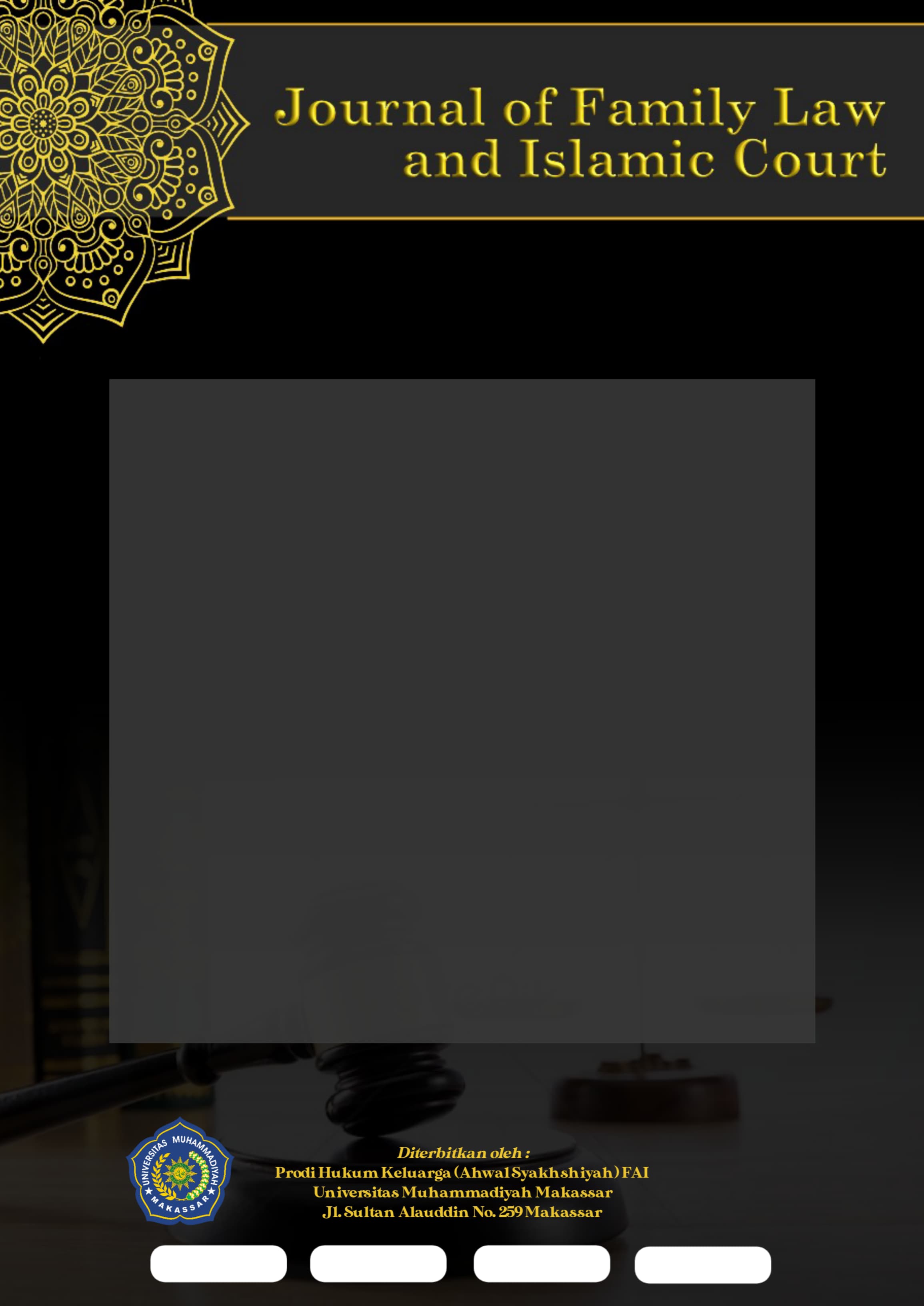The Law of the Marriage Contract for the Visually Impaired in the Perspective of Islamic Law and Madzhab Shafi'i
DOI:
https://doi.org/10.26618/jflic.v2i3.16913Keywords:
Marriage Contract, Non-verbal, Islamic Law, Shafi'i SchoolAbstract
This research explores the legal aspects of non-verbal marriage contracts (akad nikah tunawicara) from the perspectives of Islamic law and the Shafi'i school of thought. The marriage contract is an agreement between two parties who enter into matrimony through the process of ijab (proposal) and qabul (acceptance). Generally, a marriage contract is deemed valid if it meets the necessary conditions and pillars. However, for individuals with special needs, particularly those who are non-verbal, there are specific methods for conducting the marriage contract. The objectives of this research are: 1. To understand the procedures of a non-verbal marriage contract according to Islamic law. 2. To determine the legal aspects of a non-verbal marriage contract according to the Shafi'i school of thought. This research adopts the library research method, involving the examination of relevant books and literature related to the discussed issues. The findings of this study indicate that: 1. Non-verbal marriage contracts, from an Islamic legal perspective, must adhere to the pillars and conditions of marriage, similar to marriages involving individuals who can communicate verbally. Non-verbal communication can be through understandable gestures, writing, or representation by a proxy. If the individual can write, the marriage contract is valid using that written form, just as it is valid using gestures. This opinion has been agreed upon by scholars. 2. Imam Shafi‘i asserts that a marriage contract in written form is valid, provided there is someone who reads it on behalf of the party involved. If no one reads it on their behalf, the contract is considered invalid. Additionally, Imam Shafi‘i deems a marriage contract valid through gestures for those unable to write, although he suggests combining gestures with written representation if possible.
References
Abdul Aziz dkk, Fiqh Munakahat Khitbah, Nikah dan talak, diterjemah oleh Abdul Majid Khon, cet. 1, (Jakarta: Sinar Grafika Offset).
Abdul Karim Zidan, Al-Mudakhal Lidirosati Syariatil Islamiyah, (Beirut, Al-Risalah, 1418 H-1996 M).
Abdurrahman Al-Jarizi, Kitabul Fiqih Ala Mazahib Al-Arba’ah, Dar Ihya-Atturas ala A’arabi, Bierut, 1869, Jilid A.
Abi Barril Masyhur, I’anatuth Thalibin, (Lebanon: Bairut, 2005).
Ahmad al-Ghondur, al-ahwal al-syakhshiyyah di at-Tasyri' al-Islami, (Beirut: maktabah, 2006).
Ali As’ad, Fathul Mu’in, ( Menara Kudus, 1979 ).
https://glosarium.org./arti-tulisan/, (diakses pada tanggal 20, Januari 2024)
https://id.m.wikipedia.org/wiki/Bahasa_isyarat, (diakses pada tanggal 20 Januari 2024)
https://www.bridestory.com/id/blog/10-susunan-acara-akad-nikah-dalam-islam, (diakses pada tanggal, 17, Januari, 2024).
https://www.liputan6.com/hot/read/5193446/akad-nikah-dalam-islam-pahami ketentuan-dan-proses-pelaksanaannya, )diakses pada tanggal 17, Januari, 2024)
Ibnu Rusyd, Bidayatul Mujtahid Jilid 2 Terjemah Abu Usamah Fakhtur Rohman (Jakarta: Pustaka Azzam, 2007).
Kementerian Agama RI, Al-Qur’an Dan Terjemahan, (Bandung: CV.Penerbit Diponegoro , 2015 ).
Louis Ma’luf, Kamus Munjid, ( Dar al Masyruq, Beirut, 1986 ).
Masyhur, Abi Barril, I’anatuth thalibin, (Lebanon: Bairut, 2005).
Mughniyah Muhammad Jawwad, Fiqih Lima Mazhab, penerjemah Masykur A.B, Afif Muhammad, Idruss Al Kaff, (Lentera: Jakarta, 2003).
Muhammad, Abu Abdillah. 1983. Mukhtasor Al-Umm, Juz VII, (Beirut :Daru alfik)
Saleh Al-Fauzan, Fiqih Sehari-hari, Cet.I, (Jakarta: Gema Insani, 2006).
Sayyid Sabiq, Fiqh Sunnah Juz 2 (Kairo: Dar al-Fath Lil I‟lam, 1990).
Sayyid Sabiq, Fiqih Sunnah, Penerjemah Kamaludin A. Marzuki, Jilid 7, Al Maarif, Bandung, 1990.
Sobirin,” Implementasi Akad Nikah Dengan Tulisan atau Isyarat dalam Tinjauan Imam Syafi‘I” ISTI’DAL; Jurnal Studi Hukum Islam, Vol. 7 No. 1 Januari-Juni 2020.
Tim Permata Press, Kompilasi Hukum Islam, 9
UU No. 1 Tahun 1974 tentang Perkawinan.
Wahbah al-Zuhayli, Al-Fiqh Al-Islami Wa Adillatuhu Juz 4 Terjemah Abdul Hayyie al-Kattani dkk, (Jakarta : Gema Insani, 2011), Jilid 9.
Wahbah Az-Zuhaili, Fiqhi Islam Wa Adillatuhu, Jakarta : Gema Insani, 2011, Jilid 9.
Downloads
Additional Files
Published
Issue
Section
License
Journal of Family Law and Islamic Court © 2022 by JFLIC is licensed under CC BY-NC-SA 4.0
In the event that the article is received by the Editorial Team of Journal of Family Law and Islamic Court there is a decision to publish the article, the copyright of the article will be transferred to Journal of Family Law and Islamic Court.
Department of Ahwal Syakhsiyah, Faculty of Islamic Studies, Universitas Muhammadiyah Makassar as the publisher of Journal of Family Law and Islamic Court holds the copyright of all articles published in this journal.
Department of Ahwal Syakhsiyah, Faculty of Islamic Studies, Universitas Muhammadiyah Makassar holds the right to reproduce and distribute the article and author is not allowed to publish the same article published in this journal.
Statement of Authenticity and Manuscript Copyright can be downloaded: here
After filling in the statement letter, please send via e-mail: jflic@unismuh.ac.id












